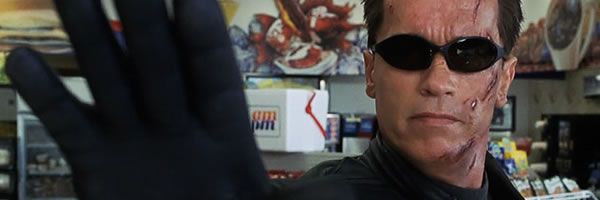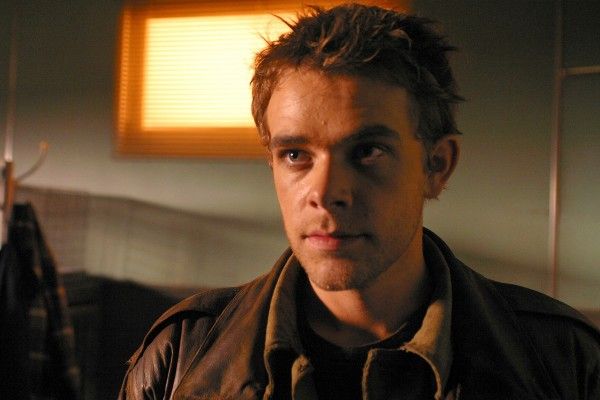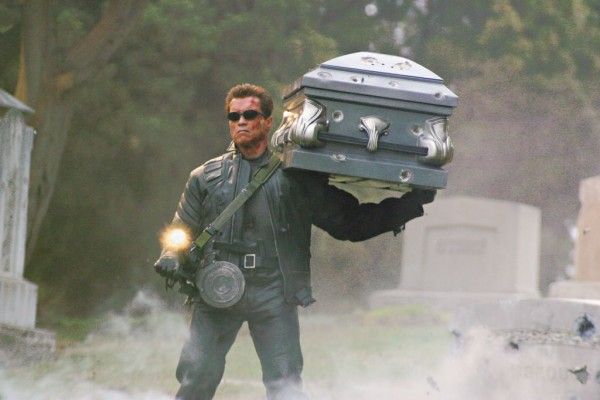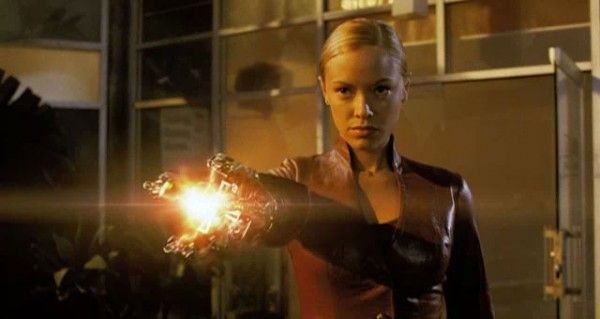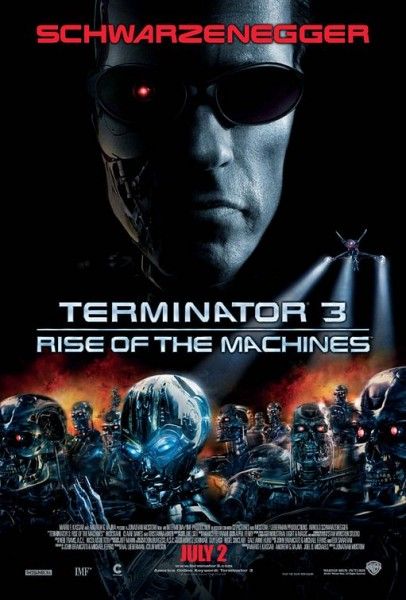If The Terminator is the hard-edged action movie of 80s, and Terminator 2: Judgment Day is the polished blockbuster of the 90s, then Terminator 3: Rise of the Machines is the forgettable film of the 2000s. It’s a movie done to service a star and a studio, not a story. The raves and devoted fanbase for Terminator: The Sarah Connor Chronicles show it wasn’t impossible to follow up Terminator 2, but the FOX TV series had the benefit of long-form storytelling. The conclusion of Terminator 2 is hopeful because it claims the future isn’t set, and we can avoid Judgment. Sarah Connor Chronicles slightly alters that to say that fate is pushing back, so it’s a constant struggle to stop Judgment Day from happening, which is a compelling story.
Terminator 3 discards all of that along with pretty much everything that made the first two movies special. To begin, the film obliterates the ending of T2. The message of hope no longer exists since John Connor (Nick Stahl) lives off the grid because he feels like he’ll always be hunted, which makes no sense since not only did they destroy Skynet (or think they did), but he also formed an emotional attachment to the Terminator (Arnold Schwarzenegger). And yet he lives a life where he has to break into a veterinary office when he’s injured rather than go to a hospital.
But the damning moment comes when the T-800 tells John that Judgment Day is inevitable. While I’ll go into the film’s strongest aspect, the ending, in a bit, I need to point out that this revelation not only undermines T2, but also paints Terminator 3 into a corner. Either one of two things can happen: John Connor and Kate Brewster (Claire Danes) will either delay Judgment Day, which means they’ve repeated Terminator 2, or the world ends. Credit to the film for doing latter even if it tries to end with the positive line, “all I know is what the Terminator taught me; never stop fighting. And I never will. The battle has just begun.”
It’s a promise of a bigger movie, which makes Terminator 3 an awkward prelude. It’s a middle chapter that fumbles the best parts of the previous movie and attempts to build to a sequel it doesn’t earn. In almost every moment you can feel the absence of James Cameron’s sure-handed approach. Cameron is a perfectionist and even when his films aren’t great (Avatar), there’s no doubt he was unrelenting until he got what he wanted.
By comparison, director Jonathan Mostow seems to be at a loss for what to do. I assume he, perhaps more than other franchise directors, was in unenviable position. On one side, he has Arnold Schwarzenegger, who had pulled in a record payday of not only $30 million up front, but 20% on the back-end, which basically guaranteed the actor would make more money than the studio. And keep in mind that Schwarzenegger hadn’t had a hit film in seven years. He needed this movie as badly as the studio needed to keep the IP alive.
I don’t know how much Schwarzenegger influenced the script, but it feels like the comic beats are his. No one tells Schwarzenegger to go into a ladies strip club, put on Elton John glasses, and later tell a guy “Talk to the hand.” Also, Schwarzenegger consented to do this scene, which mercifully was cut from the film, although the fact that it even exists should tell you a lot about why the movie is a mess:
On the other side you have a studio that’s not only bending to the will of its lead actor, but also to forcing every story demand onto a hapless director who only has three feature films under his belt, and was in no way considered a visionary. He was a hired gun who could be pushed around, and the best he could hope for was to get out of this mess with his dignity. The guiding principle behind Terminator 3 seemed to be making it like T2 but with a few inoffensive alterations, keeping the focus squarely on the Terminators, and piling on action and comedy to pummel the audience into submission.
Terminator 3 doesn’t even really want “The Terminator”. It wants the T-1000, and so it invented the TX (Kristanna Loken), and while I’m sure it’s possible to make a worse Terminator, I don’t want to consider what that would be. The TX can be summed up as “T-1000 but a sexy lady.” Yes, she has liquid metal skin that allows her to absorb bullets, and she can hack any machine, but her main power is being sexy. She can inflate her boobs, and when she needs to test a blood sample, she licks it seductively. This is how the franchise that created Sarah Connor treats its first and only female terminator.
Kate doesn’t do much better. Future Kate sounds like a badass. She responded to her husband’s death by taking control of the cyborg who killed him and sending him back to be his protector. By comparison, Present Kate has the worst day ever in human history. She is kidnapped, her fiancée is murdered, her father is murdered, and then the apocalypse happens. I suppose you could argue that Kate’s a strong person because she’s not curled up and sobbing in the fetal position by the end of the film, but I think that’s more because the character is drastically underwritten and almost always infantilized. She spends a large portion of the film locked in the back of the truck, and when her father dies, he tells John Connor—a guy he just met—to take care of his daughter.
All of this is piled on the sloppy storytelling and simple errors that could have been easily corrected. Why does the TX need a gun when her arm is a goddamn cannon? When the TX is disguised as Kate’s dead fiancée, why does it reveal its true form before the kill? If killing a future lieutenant is so important to the TX, then why is there no impetus from the Terminator to save them? Why does a film that’s rarely gruesome have a scene where the TX drives a car by punching through a guy’s torso to grab the steering wheel?
If you look closely at Terminator 3, you can see every studio note and every Schwarzenegger suggestion written down. And yet, every now and then, there’s a glimpse of a better movie that existed somewhere along the way. You have a protagonist who’s basically in purgatory. John Connor was born to be humanity’s savior, but if he stopped Judgment Day, then he has no purpose. And in case he didn’t really stop Judgment Day (although there’s no real reason for him to believe this), then it’s too dangerous to build a life. The film briefly comes back to this conflict by having John consider that, in some twisted way, he needs the apocalypse. He also rejects his destiny only to have the Terminator quickly bring John back to the realization that’s he’s a fighter (even though he gets the Terminator to do most of the fighting).
Then there’s the ending, which is ballsy insofar as it’s kind of a downer for a film that, at the time, had the biggest budget ever greenlit by a studio. And yet, as I said, this is really the only ending the movie could come to, not only because anything else would be the same damn ending as the first film (not that T3 is against cribbing from T2), but it’s the completion of John Connor’s arc; he accepts he has to lead humanity post-apocalypse, which requires an apocalypse. It’s a satisfying moment, not just because it’s a bit of a twist they realize they’re in a bunker instead of Skynet’s core, but also because it’s where the movie feels like it’s telling a real story with characters, plot developments, and resolution. Take away the TX, the set pieces, and Schwarzenegger, and you have an interesting movie.
But losing Schwarzenegger and moving the setting to the post-apocalypse presented its own problems.
Tomorrow: Terminator Salvation
Other Entries:

